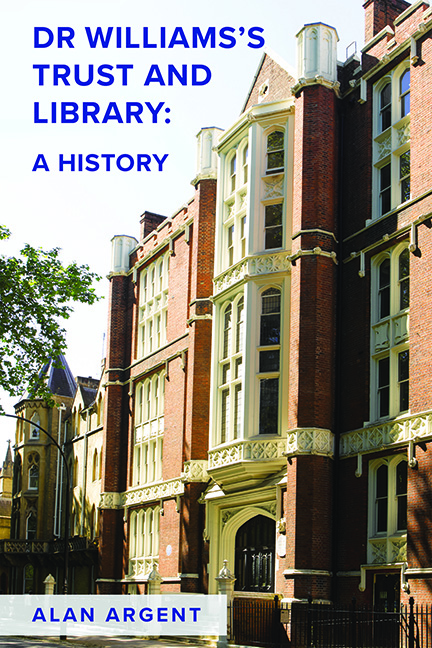Book contents
- Frontmatter
- Dedication
- Contents
- List of Illustrations
- Foreword
- Preface
- Abbreviations
- Notes on Dates, Money, Welsh Place Names and Publications
- Prologue
- 1 Dr Williams and His Will
- 2 Benjamin Sheppard, Receiver 1721–31: Faith, Fitness, and Diligence
- 3 Constructing the Library Building 1725–30: A Proper Plan
- 4 Francis Barkstead, Receiver 1731–47: Piety and Charity
- 5 John Cooper, Receiver 1748–62: Liberty and Liberal Dissent
- 6 Richard Jupp junior, Receiver 1762–95: A Very Respectable Body
- 7 Richard Webb Jupp, Receiver 1795–1850, and David Davison, Receiver 1850–7: Fashionable Sympathies Amid Increasing Light
- 8 Walter D. Jeremy, Receiver 1857–93: The Scrupulous Observer
- 9 Francis H. Jones, Secretary and Librarian 1886–1914: Introducing Order
- 10 Robert Travers Herford, Secretary and Librarian 1914–25: Application and Imagination
- 11 Stephen Kay Jones, Librarian 1925–46, and Joseph Worthington, Secretary 1925–44: A New Age with Old Strains
- 12 Roger Thomas, Secretary 1944–66 and Librarian 1946–66: Trusted Innovator
- 13 Kenneth Twinn, Secretary and Librarian 1966–76: Modest Dependability
- 14 John Creasey, Librarian, and James McClelland, Secretary, 1977–98: Mixed Blessings
- 15 David Wykes, Director 1998–2021: Past, Present, and Future
- 16 Dr Williams’s Trust: An Assessment
- Appendix 1 Trustees in 1723
- Appendix 2 Lists from Short Account (with later additions)
- Bibliography
- Index
15 - David Wykes, Director 1998–2021: Past, Present, and Future
Published online by Cambridge University Press: 26 May 2022
- Frontmatter
- Dedication
- Contents
- List of Illustrations
- Foreword
- Preface
- Abbreviations
- Notes on Dates, Money, Welsh Place Names and Publications
- Prologue
- 1 Dr Williams and His Will
- 2 Benjamin Sheppard, Receiver 1721–31: Faith, Fitness, and Diligence
- 3 Constructing the Library Building 1725–30: A Proper Plan
- 4 Francis Barkstead, Receiver 1731–47: Piety and Charity
- 5 John Cooper, Receiver 1748–62: Liberty and Liberal Dissent
- 6 Richard Jupp junior, Receiver 1762–95: A Very Respectable Body
- 7 Richard Webb Jupp, Receiver 1795–1850, and David Davison, Receiver 1850–7: Fashionable Sympathies Amid Increasing Light
- 8 Walter D. Jeremy, Receiver 1857–93: The Scrupulous Observer
- 9 Francis H. Jones, Secretary and Librarian 1886–1914: Introducing Order
- 10 Robert Travers Herford, Secretary and Librarian 1914–25: Application and Imagination
- 11 Stephen Kay Jones, Librarian 1925–46, and Joseph Worthington, Secretary 1925–44: A New Age with Old Strains
- 12 Roger Thomas, Secretary 1944–66 and Librarian 1946–66: Trusted Innovator
- 13 Kenneth Twinn, Secretary and Librarian 1966–76: Modest Dependability
- 14 John Creasey, Librarian, and James McClelland, Secretary, 1977–98: Mixed Blessings
- 15 David Wykes, Director 1998–2021: Past, Present, and Future
- 16 Dr Williams’s Trust: An Assessment
- Appendix 1 Trustees in 1723
- Appendix 2 Lists from Short Account (with later additions)
- Bibliography
- Index
Summary
The coming of the twenty-first century presented several problems. How would DWT and DWL adapt? The trustees again chose to appoint from within the fold, entrusting DWT to a man of experience and knowledge, who understood nonconformity and Unitarianism, but who used DWL as an historian, rather than as a theologian. David Wykes had much to commend him.
Context
By the late twentieth century, DWT was no longer a Unitarian preserve, although Unitarians retained a majority. The trustees included Baptists, Quakers, and English former Congregationalists (drawn from those who had joined the United Reformed Church). With them were one Moravian, a Welsh Congregationalist, and a Roman Catholic. Having returned to Catholicism from Unitarianism while a trustee, Anthony Cross (1932–2019) encountered no explicit opposition on the trust, claiming to be a ‘dissenter of the Roman Catholic persuasion’. At the start of the new century, some believed that DWT might safely include those from beyond religious nonconformity.
One experienced trustee recognised that some of his fellows merely sustained the Unitarian majority, whereas he found the Congregationalist Geoffrey Nuttall a formidable and valuable presence until his retirement in 1998, after almost fifty years. On Nuttall's resignation, this trustee noted a loss of gravitas. Another saw DWT's difficulties as reflecting the general decline of nonconformity, evidenced in theological college closures and DWL's subsequent acceptance of books and manuscripts from these institutions. Such developments suggested that planned change should be welcomed.
Placing the librarian under the secretary of the trust had not worked well and, given financial pressures in the 1990s, led to the posts of secretary and librarian being combined. Prior to Wykes's appointment, he had been a trustee for ten years (a member of the library committee) and a DWL reader since 1976. He had resigned from DWT in order to apply for the position. Wykes's background was academic, having taught history at the University of Leicester, where his specialism was late seventeenth-century English dissent. Yet his was a Unitarian family, well known to several trustees. He therefore brought strengths to his post, being proven, loyal, and familiar with the traditions of both library and trust. Moreover, he knew many who shared his interests and might see the potential of DWL's theological, historical, and literary holdings.
- Type
- Chapter
- Information
- Dr Williams's Trust and Library , pp. 271 - 278Publisher: Boydell & BrewerPrint publication year: 2022



